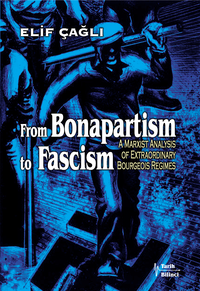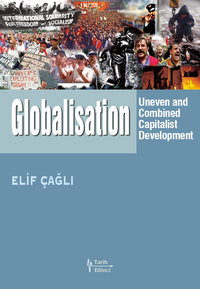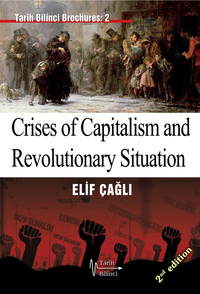1. The historical experience proved what the Marxist theory anticipated: that there is no other way than the fight of the proletariat in power to ensure the perpetuation of revolution on a world scale in order its social revolution to proceed, against those petit-bourgeois trends that would seek to contain the revolution within national boundaries. Any capitulation to petit-bourgeois revolutionism, to the petit-bourgeois trend of “national socialism” means to condemn the revolution to death.
2. It is impossible for the workers’ powers in any kind of countries, whether economically backward or advanced, to survive on their own or in isolation with one another for a prolonged period of time. And, unless the world revolution makes headway in advanced capitalist countries with the outbreak of revolutions so as to strike the capitalist system in its heart, the chance of isolated revolutions in backward countries to survive is objectively limited. Although it may be relatively easier, under certain conditions, to achieve the political revolution in backward countries, it is, on the other hand, extremely difficult to preserve the power and make the social revolution proceed. As a matter of fact, it is impossible in the last analysis, unless the world revolution helps.
3. Historical experience verifies the Marxist theory. As the proletarian revolution by its nature implies surpassing capitalism, Marx, rightfully, focused his attention on the question of revolution in the advanced capitalist countries. However, when he analysed the sharpening contradictions of tsarist Russia, he also considered that the revolution could break out in such countries without waiting for Europe and this, in turn, could stimulate the revolution in Europe. That the proletariat coming to power on a backward economic and cultural foundation such as in tsarist Russia can only survive thanks to the proletarian powers to be established in advanced countries is one of the basic premises of Marxism. Therefore, the outbreak of the proletarian revolution in Russia in 1917 does not mean that Marx was mistaken or the world revolution, henceforth, will always follow a similar course. On the contrary, the process from the October 1917 to this day signifies that Marx was not mistaken and unless the world revolution makes headway in advanced capitalist countries, the unilateral efforts of the proletariat of backward countries would not be sufficient to save the revolution viewed in a historical perspective.
4. The revolutionary explosion of 1917 in Russia forced the proletariat into power, although Russia was not ripe in terms of historical-social conditions that would constitute the material basis of a proletarian power. While it was correct, under those conditions, on the part of the Bolsheviks to give a leadership to the revolutionary proletariat for it to set up its class dictatorship, one must not, on the other hand, ignore the fact that the events during those years that followed the October 1917 testify to the historical rightfulness of Engels’ concern expressed in his lines written in 1853:
I have a feeling that one fine day, thanks to the helplessness and spinelessness of all the others, our party will find itself forced into power, whereupon it will have to enact things that are not immediately in our own, but rather in the general, revolutionary and specifically petty-bourgeois interest; in which event, spurred on by the proletarian populus and bound by our own published statements and plans — more or less wrongly interpreted and more or less impulsively pushed through in the midst of party strife — we shall find ourselves compelled to make communist experiments and leaps which no-one knows better than ourselves to be untimely. One then proceeds to lose one’s head — only physique parlant I hope —, a reaction sets in and, until such time as the world is capable of passing historical judgement of this kind of thing, one will be regarded, not only as a brute beast, which wouldn’t matter a rap, but, also as bête, and that’s far worse. I don’t very well see how it could happen otherwise. In a backward country such as Germany which possesses an advanced party and which, together with an advanced country such as France, becomes involved in an advanced revolution, at the first serious conflict, and as soon as there is real danger, the turn of the advanced party will inevitably come, and this in any case will be before its normal time. However, none of this matters a rap; the main thing is that, should this happen, our party’s rehabilitation in history will already have been substantiated in advance in its literature.[1]
5. Does not whole human history marches with victories as well as defeats such that teach the oppressed and exploited masses how to win?
The experience indicates that the outbreak of socialist revolution in a relatively backward country before advanced countries was not the result of voluntary decision of individuals but of certain objective conditions in the historical process. Therefore, it is not the business of revolutionaries to get involved in a pedantic debate as to whether “it should or not have taken place”. The point is to proceed forward by learning from an already accomplished fact. The entire historical experience must be comprehended as part of the progress of the struggle of the proletariat for emancipation, which displays a helical nature with reverses and leaps.
There has never been, and will never be, a revolution that alters everything at once and marches forward on the basis of victories alone. This is all the more the case with the world proletarian revolution, whose aim is to put a definite end to the contradictions generated by the five-thousand-year-old class society, to the exploitation of man by man, showing that the task of proletarian revolution will never be easy at all.
It is impossible to agree with those views which argue that the events since 1917 October Revolution necessitate a “revision” of Marxist perspectives, in other words, that the theory “must now be reconstructed” in light of practice experienced so far. Because, what has been experienced did not come about as a result of applying the necessary premises of Marxism, but, on the contrary, of infringing them. This was the confirmation, by way of refuting the opposite, of the correctness of the fundamental perspectives of Marxism. The historical experience verifies the Marxist prognosis that the proletarian revolutions could return to the starting-point again and again in order to overcome the deficiencies and put an end to the errors until they find out the accurate course.
… proletarian revolutions, … constantly criticize themselves, constantly interrupt themselves in their own course, return to the apparently accomplished, in order to begin anew; they deride with cruel thoroughness the half-measures, weaknesses, and paltriness of their first attempts, seem to throw down their opponents only so the latter may draw new strength from the earth and rise before them again more gigantic than ever, recoil constantly from the indefinite colossalness of their own goals -- until a situation is created which makes all turning back impossible, and the conditions themselves call out: Hic Rhodus, hic salta!
6. With the setting up of the bureaucratic regime symbolised in the personality of Stalin, the historical movement of transition from capitalism to socialism in the Soviet Union ceased to exist in reality. Despite this reality, the process under the bureaucratic dictatorship was identified with “socialism”, which dealt a very heavy blow to the revolutionary fight of the world proletariat. In order to recover from the consequences of this blow, the fundamental difference, the antagonism, between the Stalinist conception of “socialism in one country” and the Marxist conception of socialism must clearly be explained to the proletariat.
Perhaps the fact that those years that passed with the fairy-tale of “socialism in one country” under the Stalinist dictatorship did nothing but verify the genius prognosis of Marx and Engels might be the most meaningful answer to the petit-bourgeois conception of “national socialism”:
And, on the other hand, this development of productive forces (which itself implies the actual empirical existence of men in their world-historical, instead of local, being) is an absolutely necessary practical premise because without it want is merely made general, and with destitution the struggle for necessities and all the old filthy business would necessarily be reproduced; and furthermore, because only with this universal development of productive forces is a universal intercourse between men established, which produces in all nations simultaneously the phenomenon of the "propertyless" mass (universal competition), makes each nation dependent on the revolutions of the others, and finally has put world-historical, empirically universal individuals in place of local ones. Without this, (1) communism could only exist as a local event; (2) the forces of intercourse themselves could not have developed as universal, hence intolerable powers: they would have remained home-bred conditions surrounded by superstition; and (3) each extension of intercourse would abolish local communism. Empirically, communism is only possible as the act of the dominant peoples "all at once" and simultaneously, which presupposes the universal development of productive forces and the world intercourse bound up with communism.[2]
7. The main thing to be judged from the point of view of historical experience is not Stalin as a person, but the Stalinist conception of socialism, personified in Stalin and totally alien to the proletarian socialism. This conception is the “nationalist” conception of narrow-minded, selfish petit-bourgeois mentality characterised by its fear from the idea of world revolution.
Stalinism, like all social-political phenomena, is, in the last analysis, a product of objective conditions determined by the given historical conditions. It was not the will of a single person that altered the course of the history. There were strong objective factors to affect the course of events in a direction that is unfavourable for the interests of the proletariat. That the proletarian revolution took place in a backward country like Russia and that the world revolution could not proceed on the basis of revolutions in advanced countries created a favourable ground that would enable narrow-minded leaders in the type of Stalin, moulded with petit-bourgeois spirit and culture, to gain influence.
This course of events could be reversed only if there would have been such events that would develop and strengthen the world proletarian movement. Nevertheless, the progress of world revolution in Europe came to a halt and this gave a historic opportunity to Stalins. Their seizing of this historic opportunity, in turn, constituted a subjective impediment on the progress of the world revolution.
In reality, from 1917 October Revolution to the historical turning point when Stalinism managed to establish its absolute rule, there was a cut-throat struggle taking place in the USSR between those subjective elements who were acting to carry the revolution forward (the revolutionary leaders like Lenin and Trotsky who had matured and steeled on the basis of long international revolutionary experience; the Bolshevik revolutionaries who clung to the proletarian fight following the ideas of these leaders) and those subjective elements who represented the backward tendencies (Stalin-type “revolutionaries” who were product of the petit-bourgeois soil of Russia with an ingrained “nationalist” understanding of socialism; the narrow-minded leaders who consider that the point is not to change the world, but to rule an apparatus, who do not seek to gain superiority by revolutionary ideas, but by bringing into line the individuals through administrative means).
Because the given objective conditions were less favourable for the progressive elements, such a leader in the type of Stalin and those aparatchiki in his command could dominate the party and the state. From then on Stalinism turned into a subjective factor affecting the course of the world revolution. Stalinism drew the communist parties to a conception of socialism which is based on the conciliationist line of the Second International, to the policies of “people’s front” which means conciliation with the bourgeoisie, to the programme of revolution in stages. The Marxist perspective of the social revolution of the proletariat, the perspective of permanent revolution, was strangled; workers of the world were condemned, on the basis of the monstrosity called “socialism in one country”, to a strategy in which socialism was identified with a bureaucratic campaign of industrialisation.
8. The fact that there is an objective explanation for the appearance of Stalinism on the stage of history can never be used as an excuse to rid Stalin of his sins. On the other hand, that such a tendency hostile to the revolutionary struggle of the proletariat is symbolised in the person of Stalin must never serve as an excuse to gloss over the problem by a light approach of comparing the rights and wrongs of a “single person”. The question is not the bookkeeping of the rights and wrongs of a mortal person in the course of history. The question is to explicitly admit what an impediment the tendency of Stalinism constituted on the progress of the world revolution, how it blackened the fight for socialism. It is the question of condemning such a tendency without slightest hesitation.
Only a philistine who fears from revolution, from changing the world, can shy away from admitting the truth. It is they who might try to palm off an outcome which must not be accepted from the point of view of the revolutionary struggle of the proletariat, as a “success” in order to ease themselves and escape from the struggle. This is the predicament of the apologetics of Stalinism who still insist on the old.
But the facts are merciless! The results of the Stalinist sort of socialism have been revealed all out with its collapse. And it is the task of the revolutionary Marxists to convey the lessons of the historical experience to the struggle of the proletariat and to reveal the true face of Stalinism which counterfeitingly identified itself with Leninism.
9. Should we be mere spectators of history by putting all the blame on the historical “inevitability” for the fact that the course of events acted to clear the way for Stalin-type leaders for a certain period of time, rather than leaders like Lenin and Trotsky? Absolutely no! On the contrary, despite its negative aspects, this historical experience, with its richness, enables us to comprehend the world in which we live, showing us what is to be done in order to change it.
The domination of Stalin-like people for a certain period of time in the course of historical process never eliminates the importance of the conscious intervention of the revolutionary vanguard in the process and of its historical function. On the contrary, it reveals its bitter importance in a most dramatic way.
10. The Stalinist brand of socialism is destined to get exhausted at a certain point of its development and yield to international capitalism. Given the domination of capitalist world market, the aim of catching up with and surpassing the world capitalism within national framework is a reactionary utopia which has got nothing to do with the Marxist conception of socialism, without any chance of materialising.
It is the Gorbachov period when the bill of the sixty-year reactionary utopia was paid. In this context, there is nothing surprising in Gorbachovs’ or Yeltsins’ endeavours to get integrated into international capitalism. This is exactly the destination where such a bureaucratic regime can arrive.
In a moment when the bureaucratic regimes in the so-called “socialist” countries went bankrupt as a result of a prolonged process, the dominant bureaucracy faced a dilemma: either being swept out of the pages of history by the struggle of the working class or reconstructing its privileged social position on a different basis (i.e. the bourgeois order) by getting integrated into world capitalism and turning bourgeois.
Thus the principal task is to teach the world proletariat that these bureaucratic sovereignties with all kinds of their leaders, Stalin, Khrushchev, Brezhnev, Gorbachov, etc., are enemies of the struggle of the world proletariat for emancipation.
11. Humanity moves ahead by correcting its own mistakes in making its history. However, this progress has never been spontaneous, nor will it be. Marxism is not necessary for revolutions to break out, but in order proletarian revolutions to succeed and proceed, a leadership is necessary, capable of equipping the proletariat with the revolutionary Marxist consciousness.
12. The experience so far does not prove the bankruptcy of Marxism but of such a brand of “socialism” that represents its negation. Nevertheless, the collapse of Stalinism does not automatically bring along a rise of revolutionary Marxism. However, as long as the unbearable consequences of capitalism exist, the vindication of Marxism, the necessity of resolving the social contradictions of our age in favour of the proletariat and the suppressed, will be coming to light time and again.
The founders of Marxism did not have a limited vision of just the 20-30 years ahead of themselves. They dwelled on the problems and perspectives of an entire historical epoch, i.e. the age of proletarian revolutions, which would put an end to capitalism and enable the transition to classless society. To the extent that capitalism did not develop into a world system linking up the entire world, the profound content of the theoretical prognoses of Marx and Engels with regard to future could not be comprehended adequately. Nevertheless, in the period after the death of Marx and Engels until the present day, their prognoses with regard to future have become much more understandable in a more vivid and profound way, as capitalism turned into a tremendous world system, connected the destinies of nations to each other, made the national borders become reactionary, brought capital and labour face to face on a world scale.
13. The current social unrest throughout the world is the universal-historical struggle of the past and the future, of the right and wrong. Unless the revolutionary internationalist content of the emancipation struggle of the proletariat is understood correctly and a corresponding struggle is organised on an international level, the limited revolutionary efforts on a national scale will prove inadequate.
14. In her assessments on the October Revolution, Rosa Luxemburg stated that the Bolsheviks’ unintentional mistakes forced upon them by the pressure of the objective conditions were fair enough, but “they [would] render a poor service to international socialism for the sake of which they have fought and suffered; ... [when] they want to place in its storehouse as new discoveries all the distortions prescribed in Russia by necessity and compulsion.”[3] The danger she pointed out came into being when the rule of Stalinism was founded. While putting an end to the power of the working class, Stalinism entirely distorted the worldview of the working class, i.e. Marxism. And the order of the bureaucracy has been theorised as “socialism” for long years.
And thus lies replaced the truth and unpleasant realities were hidden behind a mist, an illusory screen. And it was this illusory screen that was presented as the superiority of socialism for years. However, the sharp arrows of historical reality have punctured this screen. In the face of this fact those people who could not face the shock are shedding tears for the gone screen instead of facing the reality however bitter it is.
Yet this is not a revolutionary attitude. In order to change the world, we need to know the truth and truth alone and act on the basis of concrete reality. Remember that the most devastating for the revolution are illusions; the most useful is sincere and plain truth.
[1] Marx and Engels, Engels to Joseph Weydemeyer in New York (12 April 1853), MECW Volume 39, p.308-9
[2] Marx and Engels, Selected Works, Vol. I, p.37.
[3] Rosa Luxemburg, “The Russian Revolution,” in Rosa Luxemburg Speaks, p.539
Source:
link: Elif Çağlı, XI. The Conclusions Drawn from the Historical Experience, May 1991, https://enternasyonalizm.org/node/575






